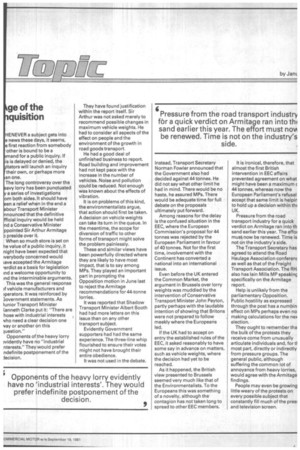ge of the quisition
Page 25

If you've noticed an error in this article please click here to report it so we can fix it.
HENEVER a subject gets into e news these days, it seems, e first reaction from somebody other is bound to be a mend for a public inquiry. If is is delayed or denied, the itators will launch an inquiry their own, or perhaps more an one.
The long controversy over the avy lorry has been punctuated a series of investigations om both sides. It should have en a relief when in the end a bour Transport Minister nnounced that the definitive fficial inquiry would be held rid a Conservative Minister ppointed Sir Arthur Armitage D preside over it.
When so much store is set on he value of a public inquiry, it night have been expected that !verybody concerned would lave accepted the Armitage rerdict as a basis for legislation Ind a welcome opportunity to !nd the interminable arguments. This was the general response yf vehicle manufacturers and )perators. It was reinforced by 3overnment statements. As lunior Transport Minister (enneth Clarke put it: "There are hose with industrial interests vho need a clear decision one rimy or another on this luestion."
Opponents of the heavy lorry widently have no "industrial nterests." They would prefer ndefinite postponement of the lecision. They have found justification within the report itself. Sir Arthur was not asked merely to recommend possible changes in maximum vehicle weights. He had to consider all aspects of the effect on people and the environment of the growth in road goods transport.
He had a good deal of unfinished business to report. Road building and improvement had not kept pace with the increase in the number of vehicles. Noise and pollution could be reduced. Not enough was known about the effects of vibration.
It is on problems of this kind, the environmentalists argue, that action should first be taken. A decision on vehicle weights can take its turn in the queue. In the meantime, the scope for diversion of traffic to other forms of transport might solve the problem painlessly.
These and similar views have been powerfully directed where they are likely to have most impact, that is to say among MPs. They played an important part in prompting the Opposition motion in June last to reject the Armitage recommendations for 44-tonne lorries.
It was reported that Shadow Transport Minister Albert Booth had had more letters on this issue than on any other transport subject.
Evidently Government supporters had had the same experience. The three-line whip flourished to ensure their votes might not have brought their entire obedience.
It was not used in the debate. Instead, Transport Secretary Norman Fowler announced that the Government also had decided against 44 tonnes. He did not say what other limit he had in mind. There would be no haste, he assured MPs. There would be adequate time for full debate on the proposals ultimately put forward.
Among reasons for the delay is the confused situation in the EEC, where the European Commission's proposal for 44 tonnes was rejected by the European Parliament in favour of 40 tonnes. Not for the first time, involvement with the Continent has converted a national into an international issue.
Even before the UK entered the Common Market, the argument in Brussels over lorry weights was muddied by the intervention of Conservative Transport Minister John Peyton, partly perhaps with the laudable intention of showing that Britons were not prepared to follow meekly where the Europeans led.
If the UK had to accept on entry the established rules of the EEC, it asked reasonably to have some say in advance on matters, such as vehicle weights, where the decision had yet to be reached.
As it happened, the British view presented to Brussels seemed very much like that of the Environmentalists. To the Europeans this was something of a novelty, although the contagion has not taken long to spread to other EEC members. It is ironical, therefore, that almost the first British intervention in EEC affairs prevented agreement on what might have been a maximum 44 tonnes, whereas now the European Parliament's refusal accept that same limit is helpir to hold up a decision within thf UK.
Pressure from the road transport industry for a quick verdict on Armitage ran into th sand earlier this year. The effoi must now be renewed. Time is not On the industry's side.
The Transport Secretary has agreed to attend the Road Haulage Association conferenc as well as that of the Freight Transport Association. The RH. also has lain Mills MP speaking specifically on the Armitage report, Help is unlikely from the parliamentary Opposition. Public hostility as expressed through the post has a nu mbin effect on MPs perhaps even no making calculations for the ne›! election.
They ought to remember the the bulk of the protests they receive come from unusually articulate individuals and, for II most part, directly or indirectly from pressure groups. The general public, although suffering the common lot of annoyance from heavy lorries, would agree with the Armitage findings.
People may even be growing little weary of the protests on every possible subject that constantly fill much of the pres! and television screen.








































































